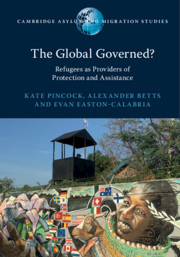Conclusion
Published online by Cambridge University Press: 06 March 2020
Summary
This chapter reviews our basic claim: refugee-led organisations exist, and they deserve recognition for the important roles they play. We draw out comparative analysis of RCOs based on nationality and leadership and the political economy in which they partake, and discuss practical and theoretical implications. Many RCOs offer social protection to refugees and fill gaps left by national or international providers in areas as diverse as education, vocational training, psychosocial support, health, microfinance, sport, youth engagement and legal representation. They vary in scale, focus and capacity, demonstrating the many ways in which refugees mobilise to support vulnerable members of the community. They are providing protection and assistance – the very services normally associated exclusively with international aid agencies and NGOs. For many refugees, especially those in cities, such sources of community support are perceived as more relevant to their lives than those provided by large-scale aid organisations. Yet refugee-led organisations rarely receive recognition or funding from the international humanitarian system. A deeper understanding of how they have and can contribute to refugee aid and development can act as a crucial next step to begin restructuring the architecture of assistance.
Keywords
- Type
- Chapter
- Information
- The Global Governed?Refugees as Providers of Protection and Assistance, pp. 110 - 121Publisher: Cambridge University PressPrint publication year: 2020



